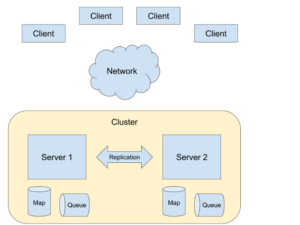We are pleased to announce the release of Chronicle Datagrid which is a cloud ready distributed framework for access to concurrent in-memory Maps, Queues and Microservices thus allowing sub millisecond access to multiple dataset giving an instantaneous “view of the world”.
Chronicle Datagrid has been developed to handle millions of events per second, ensuring that Chronicle Datagrid is able to scale to effectively and efficiently handle inputs from thousands of constantly streaming devices. These capabilities allow Chronicle Datagrid to be used across various applications and various industries including IoT applications, Low Latency monitoring , a consolidated view of a distributed microservices architecture, etc.
Below is a standard configuration, clients will connect to the cluster via a network (Internet or local network) and will then connect to any of the managed resources in the cluster (I. Map or Queue). The cluster consists a number of servers that will replicate the managed resources across themselves to ensure full redundancy. Unlike other In Memory Data Grid solutions the Chronicle solution allows each server to have complete access to the dataset which ensures a much more deterministic solution

Main features of Chronicle Datagrid include:-
Low-Latency – Each server has access to the entire dataset ensuring low latency access to data even if levels of data affinity is low. Datagrid has been benchmarked against competitors including Hazelcast IMDG with very favourable results.
Persistent– Queues and Maps are persisted to file systems creating a system of record and allowing servers to rejoin clusters at any time
High Availability and Scalability – Chronicle Datagrid can connect several servers within a cluster and upto 127 servers can be configured in a cluster ensuring capacity and redundancy
Concurrent– Chronicle Datagrid is fully concurrent and will maintain consistency across clients and threads within a client and also a cluster
Cloud Enabled– Datagrid servers and clients can easily be deployed using Docker and works with cloud providers including AWS, GCP and Azure